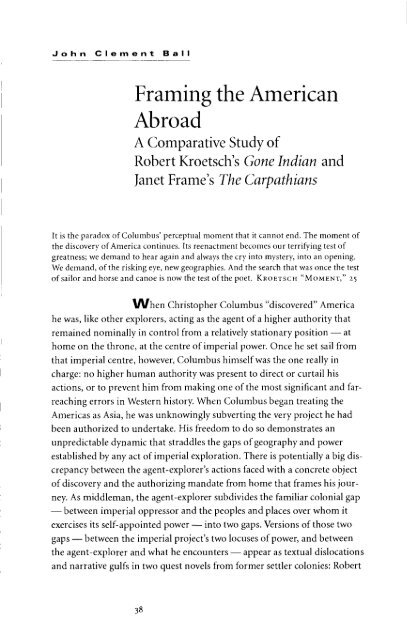The Carpathians - University of British Columbia
The Carpathians - University of British Columbia
The Carpathians - University of British Columbia
Create successful ePaper yourself
Turn your PDF publications into a flip-book with our unique Google optimized e-Paper software.
J o h n C l e m e n t B a l l<br />
Framing the American<br />
Abroad<br />
A Comparative Study <strong>of</strong><br />
Robert Kroetsch's Gone Indian and<br />
Janet Frame's <strong>The</strong> <strong>Carpathians</strong><br />
It is the paradox <strong>of</strong> Columbus' perceptual moment that it cannot end. <strong>The</strong> moment <strong>of</strong><br />
the discovery <strong>of</strong> America continues. Its reenactment becomes our terrifying test <strong>of</strong><br />
greatness; we demand to hear again and always the cry into mystery, into an opening.<br />
We demand, <strong>of</strong> the risking eye, new geographies. And the search that was once the test<br />
<strong>of</strong> sailor and horse and canoe is now the test <strong>of</strong> the poet. KROF.TSCH "MOMENT," 25<br />
When Christopher Columbus "discovered" America<br />
he was, like other explorers, acting as the agent <strong>of</strong> a higher authority that<br />
remained nominally in control from a relatively stationary position — at<br />
home on the throne, at the centre <strong>of</strong> imperial power. Once he set sail from<br />
that imperial centre, however, Columbus himself was the one really in<br />
charge: no higher human authority was present to direct or curtail his<br />
actions, or to prevent him from making one <strong>of</strong> the most significant and farreaching<br />
errors in Western history. When Columbus began treating the<br />
Americas as Asia, he was unknowingly subverting the very project he had<br />
been authorized to undertake. His freedom to do so demonstrates an<br />
unpredictable dynamic that straddles the gaps <strong>of</strong> geography and power<br />
established by any act <strong>of</strong> imperial exploration. <strong>The</strong>re is potentially a big discrepancy<br />
between the agent-explorer's actions faced with a concrete object<br />
<strong>of</strong> discovery and the authorizing mandate from home that frames his journey.<br />
As middleman, the agent-explorer subdivides the familiar colonial gap<br />
— between imperial oppressor and the peoples and places over whom it<br />
exercises its self-appointed power — into two gaps. Versions <strong>of</strong> those two<br />
gaps — between the imperial project's two locuses <strong>of</strong> power, and between<br />
the agent-explorer and what he encounters — appear as textual dislocations<br />
and narrative gulfs in two quest novels from former settler colonies: Robert

















